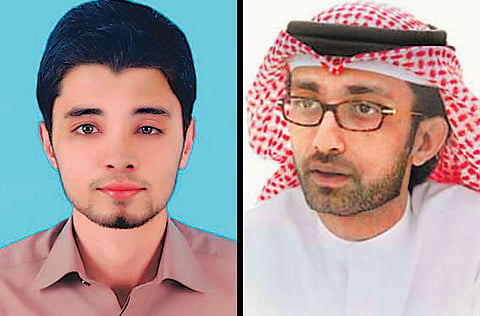Thalassaemia patients share their stories
Social stigma and lack of opportunities are major concerns

Dubai -- Emirati Saeed Ja’afar Al Awadhi’s parents knew something was wrong with him when he was only six months old.
“They said I was crying all the time and my face seemed yellowish. At that time, nobody knew anything about thalassaemia. So they took me to India to find out,” he says.
Al Awadhi was diagnosed with the blood disorder, but his parents wanted a second opinion and checked with a doctor in the UK, where they had gone for a holiday.
The doctor also diagnosed him as a thalassaemic and advised immediate treatment, but travel plans had already been made and the family continued on to Germany. There, Al Awadhi’s condition deteriorated and he had to be given blood transfusion.
“I was nine months old at that time,” he says.
Al Awadhi needs a blood transfusion 3-4 times a week. “I need three [blood] donors,” he says. The donors provide him with three units each time (each unit is 350ml blood).
After the transfusions, Al Awadhi needs medication to get rid of excess iron in his body, which could damage the liver, heart and other vital organs. This can be done through an injection or a pill. The injection takes hours to administer while the pill manages the iron overload in only certain parts of the body.
“Children who undergo iron chelation therapy through injections are not able to go to school the next day,” Al Awadhi says. That is why many of the patients are unschooled and need support to find jobs.
Though Saeed was himself unschooled, he is today a member of the board of directors of Thalassaemia International Federation and the Emirates Thalassaemia Society, where he advocates for his fellow patients.
Al Awadhi is happy with how thalassaemics are treated in the UAE. “The laws give us enough rights,” he says.
The cost of treatment is prohibitive, but the government pays for it 100 per cent, he says.
But the social stigma that thalassaemics hurts Al Awadhi. “Did you know that a public prosecutor has thalassaemia, or that we have a footballer with the affliction? ” he says, emphasising the fact that thalassaemics can lead normal lives.
He admits that times have changed and families are not hiding their thalassaemic children anymore.
‘I’m desperate for a regular job’
Thalassaemia has left Pakistani expatriate Waseem Saif Ul Islam, 24, with a curious problem: He looks very young for his age.
While this condition would be welcomed by most of us who try to mask our years, this is hindering Ul Islam’s survival. Employers hesitate to hire him as he does not look mature enough.
Ul Islam lives in Dubai alone because he feels going home to Peshawar is not an option. “There is no blood [in Pakistan hospitals] and when I don’t get blood [transfusions], I am unable to walk and my back aches,” he says.
Ul Islam was born in Dubai. His parents found out that he was thalassaemic when he was six months old. “My mother told me that I was very ill when I was a baby,” he says.
His father’s business did not take off and his parents had to go back to Pakistan, but they were forced to leave him behind because of his condition.
The health care system is excellent in Dubai. Ul Islam gets both the transfusions and his medication free. “Every 20 days I get a call [from the Dubai Thalassaemia Centre] asking how I feel and to remind me of my treatment schedule,” he says.
Other than requiring regular transfusions, Ul Islam leads a normal life and can work an eight-hour shift. He is desperate for work and a social worker is helping him survive with part-time jobs.
“I am ready to do any work. I have completed a computer course and have a driving licence,” he says.
The coordinator of the Dubai Thalassaemia Centre says that perception about people with this genetic disease is slowly changing.



